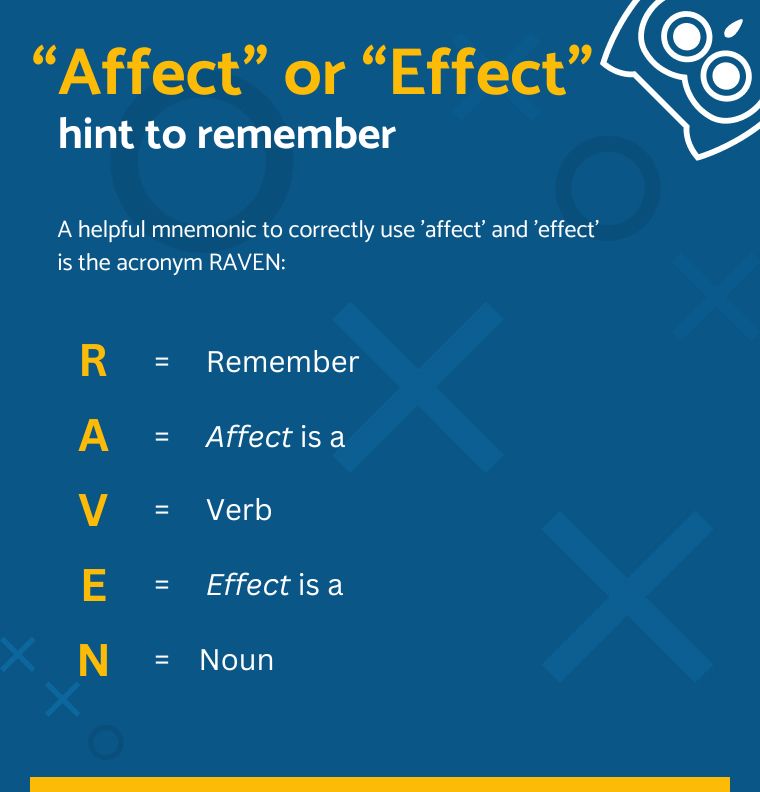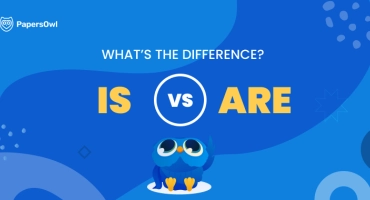Affect vs. Effect: Easy Guide to Understanding the Difference
Table of contents
Confused about when to use “affect” and “effect“? You’re not alone!
Many students, both native and non-native English speakers, often mix them up. These words sound similar, and their meanings are related, so it’s easy to see why they cause confusion.
But don’t worry — it’s easy to get the hang of. In this guide, we’ll break down the differences in a simple way so you can use these words correctly every time. Whether you’re working on an essay, writing assignments, or even buying a personal statement, this resource has got you covered.
Key Differences:
- Affect is a verb (it affects something).
- Effect is a noun (it’s the result of something).
- Affect can also refer to emotions in psychology (e.g., flat affect).
Keep reading to master the usage of “affect” vs. “effect” and boost your writing!
The Difference Between “Affect” and “Effect”
If you would like to know how to use these words in their proper context, especially when writing about satirical topics, you have come to the right place. Before going any further, let’s take a look at how these words are actually different.
The difference between “affect” and “effect” primarily lies in their roles in a sentence and their meanings:
| Word | Meaning | Example |
|---|---|---|
| Affect (Verb) | Used as a verb, meaning to influence or bring about a change. | “The weather can greatly affect your mood.” |
| Effect (Noun) | Used as a noun, referring to the result or outcome of an influence. | “The effect of the new law was an increase in voter turnout.” |
In particular, let’s look at the terms “an affect” and “in effect”. This will provide you with some insight into how and when to use them.
- An Affect: make a difference to or have an impact on something
- In Effect: a result or a consequence of an action of something else
Unfortunately, it isn’t always so cut and dry and you will have to change how these words are included in sentences. This is because both of these words can be used as verbs as well as nouns.
Take the words affected and effected, for example. Here, both of the words are in their verb form. This can make it a lot more confusing to figure out how to use them.
While “affect” is typically used as a verb and “effect” as a noun, there are a few rare exceptions to this rule:
Effect as a Verb: In some cases, “effect” can be used as a verb, meaning to bring about, to accomplish, or to cause something to happen. This usage is often found in more formal or technical contexts.
Example: “The new director will effect significant changes in the department.”
Affect as a Noun: In the realm of psychology and psychiatry, “affect” is used as a noun. In this context, it refers to an observable expression of emotion or feelings.
Example: “The patient displayed a flat affect throughout the assessment, showing very little emotional response.”
These exceptions are less commonly encountered in everyday language but are important to recognize for their specific applications in certain professional fields. Understanding these nuanced uses can enhance both the precision and depth of your communication in specialized contexts.
Affect vs. Effect: Examples
Affect
- The weather can affect your mood.
- Stress can affect your health.
- Lack of sleep will affect your performance at work.
- The teacher’s comments affected the student’s confidence.
- The new law will affect the economy.
- Her speech affected the audience deeply.
- The medication may affect your appetite.
- A lack of exercise can affect your energy levels.
- The harsh words affected his emotions.
- The news about the accident affected her greatly.
- His decision affected the outcome of the game.
- The changes in policy will affect the community.
- How you behave can affect how others perceive you.
- Environmental factors affect how plants grow.
- His attitude toward the project affected its success.
Effect
- The effect of the new law was an increase in voter turnout.
- The effect of the storm was severe flooding.
- The effect of his actions was felt throughout the company.
- Exercise has a positive effect on mental health.
- The effect of the medication was immediate.
- The effect of the policy changes will be seen next year.
- The effect of the speech was inspiring to everyone in the room.
- The effect of global warming is becoming more evident.
- The effect of the movie on the audience was overwhelming.
- The new technology had a profound effect on the industry.
- The effect of the pandemic on the economy is still being studied.
- The effect of his hard work was a promotion at the company.
- The effect of the decision was a significant drop in profits.
- The effect of exercise on mood is well-documented.
- The effect of the new rules was an improvement in performance.
How to Write Affect vs. Effect in a Sentence
The key to using “affect” and “effect” correctly lies in understanding their primary roles and meanings in a sentence. However, as with many grammar issues, there are common punctuation errors that can further confuse the understanding of such terms, especially when they are used in complex sentences.
Here are a few examples to help you figure out the structure:
- Leaders must understand the effects of their decisions on their citizens.
- The leaders’ decisions affected the citizens negatively.
- Weight gain is the effect of eating too much junk food.
- Your weight is affected by your diet.
- The construction noise outside is affecting my concentration
- The effect of the construction noise is a loss of concentration for the students
How to Remember the Rule of Affect or Effect
No doubt, all of these grammar rules can be quite daunting and difficult to remember immediately. For this reason, some individuals may require some advice to help them differentiate between ‘affect’ and ‘effect’.
Fortunately, there is a simple and straightforward hack that can be used. To remember the difference, one can use the acronym ‘A’ for ‘affect’ and ‘E’ for ‘effect’.
Additionally, if you are still having trouble, it might be beneficial to consider taking the assistance of an assignment writing service, which can provide expert assistance with any grammar-related issues.

Once again, though, remember that there are exceptions to this rule. Nevertheless, in most common situations, this is a trick that will help you to keep these specific terms straight in your head.
Сheck More Commonly Confused Words
- Is vs. Are
- Masters degree or Master’s degree
- Dispose or Dispose of
- Apart vs. A part
- Beside vs. Besides
Conclusion
Understanding the difference between affect and effect may take some practice, but with the right guidance, you’ll master it in no time. Remember, affect is usually a verb (to influence), and effect is a noun (a result).
If you’re still unsure about using these words correctly, online paper editing services can be a great help. They can review your work and provide corrections, helping you improve your writing skills.
By practicing these rules and applying them in your writing, you’ll gain confidence in using affect and effect accurately. Keep learning, and don’t hesitate to seek assistance when needed.
For more help, you can turn to do my paper for me services, which also offer professional editing to ensure your writing is clear, accurate, and polished.
Best of luck with your writing!








